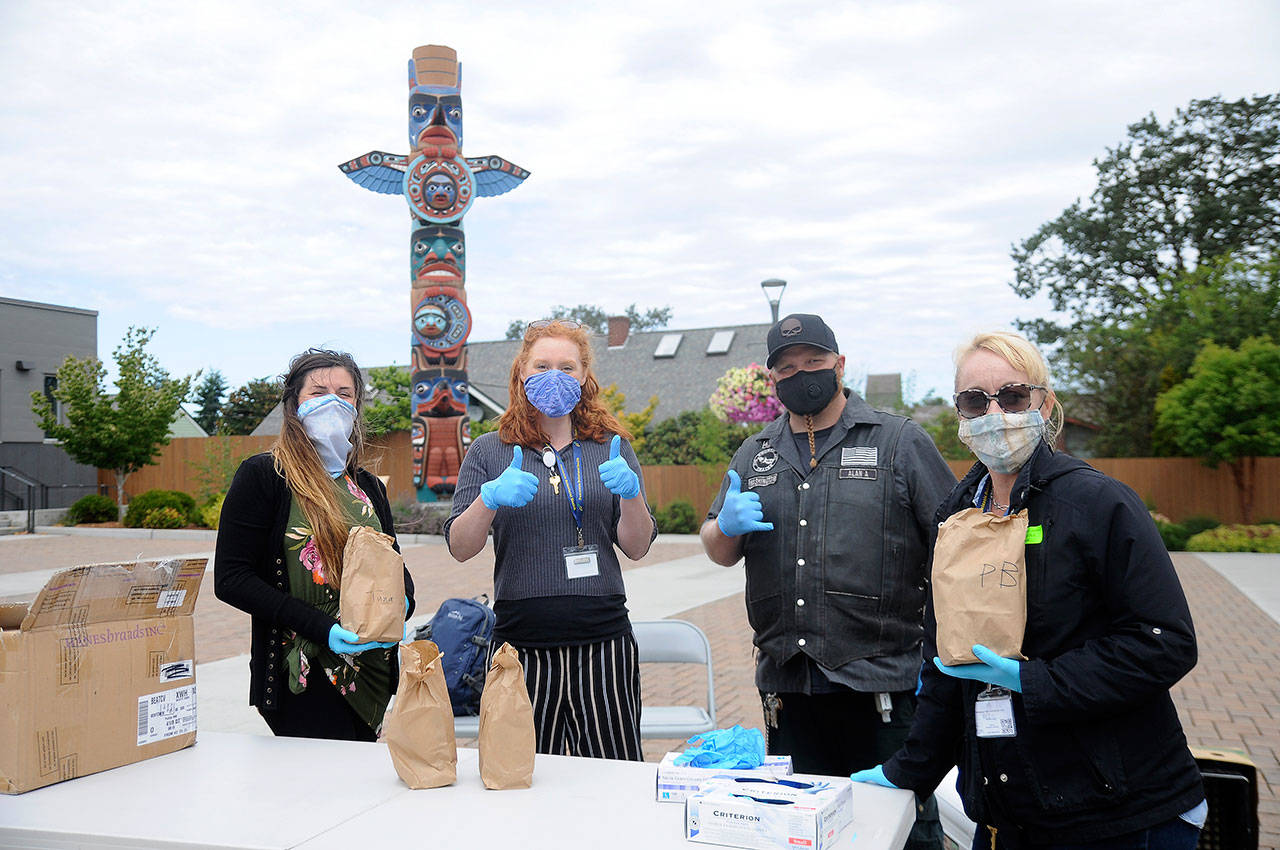A multi-year, multi-agency effort to address homelessness/housing, drug abuse and addiction, mental health issues and food security has hit the Sequim streets in the form, on some days, of personal masks and peanut butter and jelly sandwiches.
Developed about two years ago by the City of Sequim to address some key social issues in Sequim, the Sequim Health & Housing Collaborative (SHHC) is out of planning stages and putting the effort of seven partner agencies to work, with its initial focus on homelessness issues.
That effort includes staff from Peninsula Behavioral Health and OlyCAP (Olympic Community Action Programs) handing out brown bag lunches and face masks at noon on Thursdays at the Sequim Civic Center Plaza, and eventually a mobile unit, to help connect residents with the services they need most.
“It took a really long time figuring how how this was going to look like,” said Rebekah Miller, development coordinator for Peninsula Behavioral Health, who writes grants and represents her organization in the collaborative.
With a $75,000 grant from the City of Sequim, it took a full year of planning with partner agencies — OlyCAP, Sequim Food Bank, Dungeness Valley Health & Wellness Clinic/Sequim Free Clinic, Olympic Peninsula Community Clinic (formerly VIMO), Health Families of Clallam County, Parenting Matters and Peninsula Behavioral Health — before the group was ready to put together on-the-ground efforts, she said.
Then, COVID-19 hit.
Now, Miller said, the team is “reach(ing) out to people who are not aware of services.”
That effort includes seeking out what homelessness looks like in Sequim, an item of particular interest for Peninsula Behavioral Health’s PATH (Projects for Assistance in Transition from Homelessness) program — one that provides outreach and case management for homeless adults and families.
“Everybody assumes we know what the Sequim homeless population looks like,” Miller said, but tracking that population and helping individuals can be elusive. The SHHC program is putting outreach team members into the community for a bit of reconnaissance about Sequim’s homeless.
“Everybody’s been guessing; these guys are really going to help inform what this (program) is going to look like,” Miller said.
Hence, the free lunches and masks on Thursdays, “navigators” at the Sequim Food Bank on food distribution days and, by the end of the month, a retrofitted van to provide services and information wherever needed, Miller said.
“We’re going to use it as a mobile outreach office,” she said.
People in need will be able to use the mobile unit to sign up for services such as Medicaid and, possibly in the future, get medical service on the spot, she said.
The collaboration now has a budget so they can help people who are homeless or have issues with COVID-19 into hotel rooms, Miller said.
But housing is just one of several services the Sequim Health & Housing Collaborative outreach team members have been asked about, she said, including: home repairs; auto repairs; help with mortgages and rent; help getting out-of-state birth certificate; how to get a medical or mental health intake completed; free phones; places to donate; filling out forms, and others simply looking for community connection — either for a purpose or just “to feel part of something.”
With this collaboration, Miller said, “we want the citizens to define what the problem is.”
Many people with housing issues are hesitant and dubious about making connections with others trying to help, she said. That’s why the program is putting familiar, friendly faces at the Sequim Civic Center Plaza and Sequim Food Bank each week.
“It takes a long time to establish relationships … with people,” Miller said. “It’s going to take some time because people are skeptical.”
She added, “This is my favorite project because I think it’s a novel approach.”
For more information, contact Miller at rebekahm@peninsulabehavioral.org or 360-457-0431 x159.



